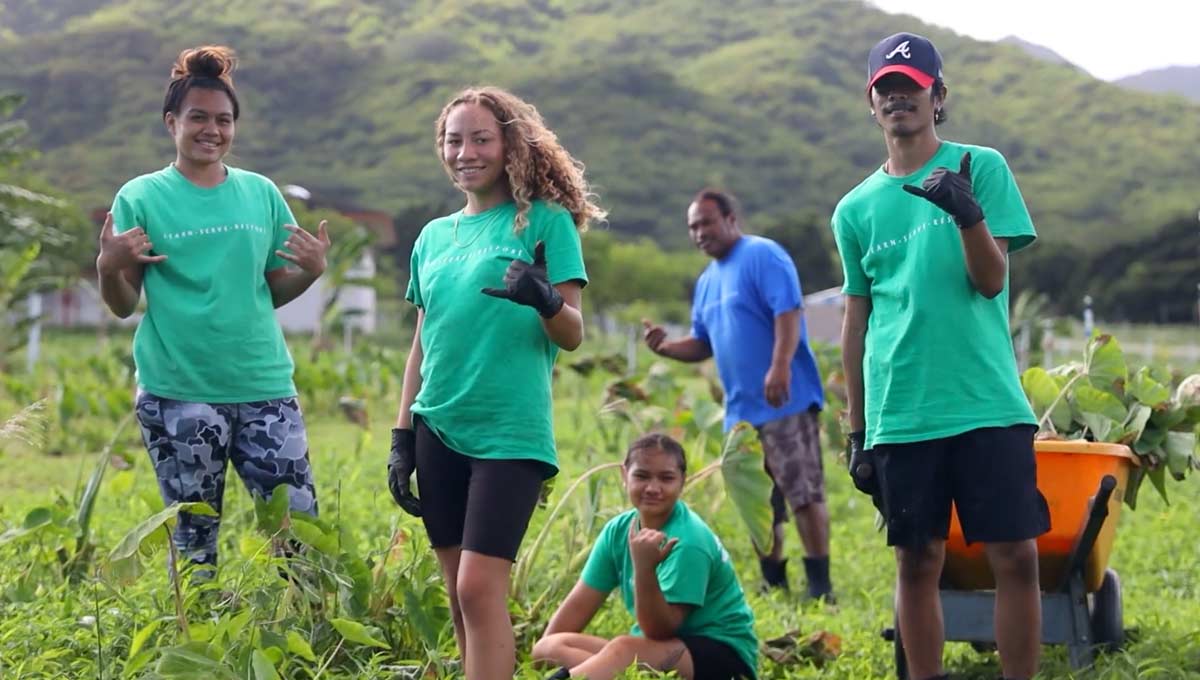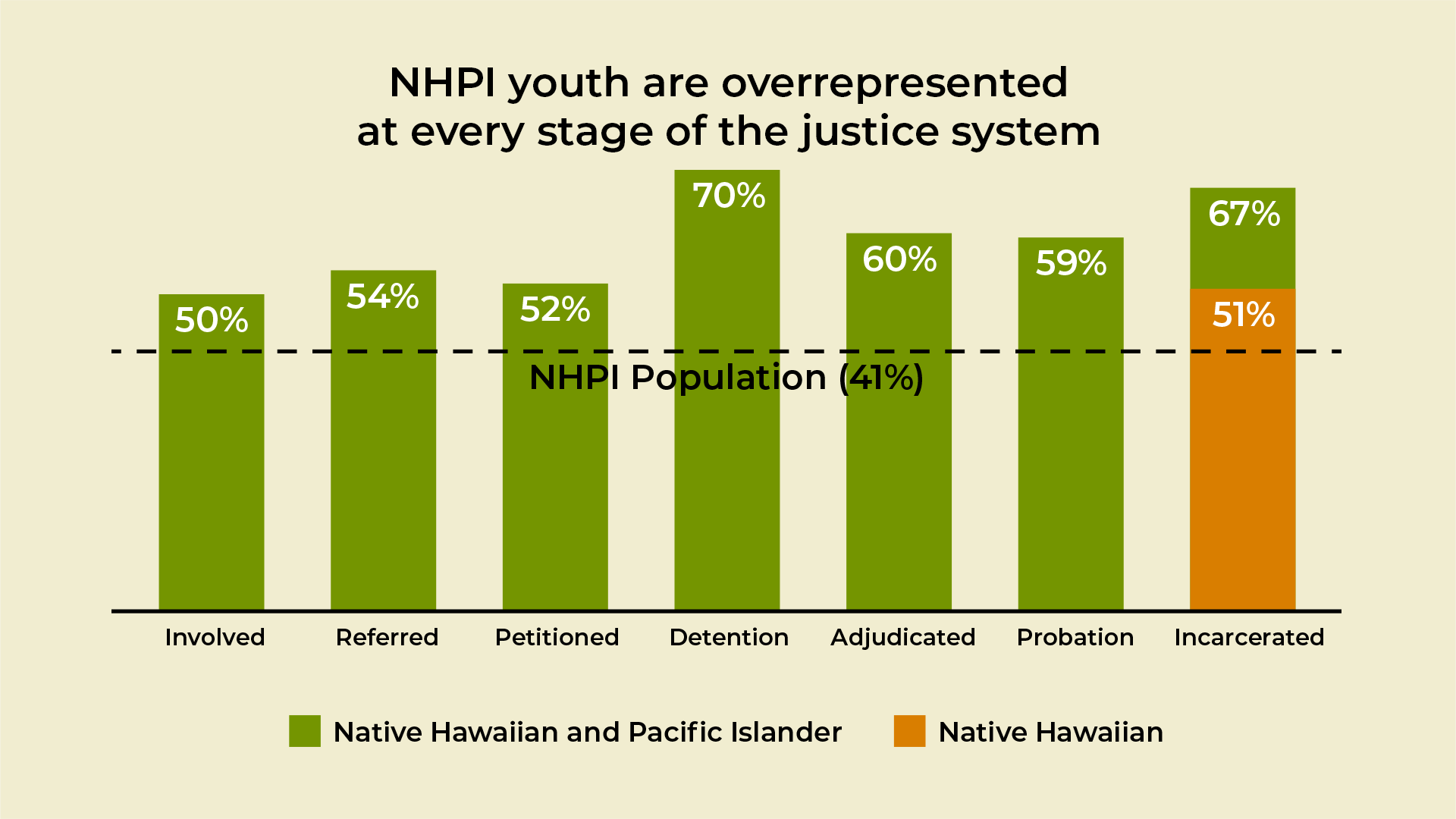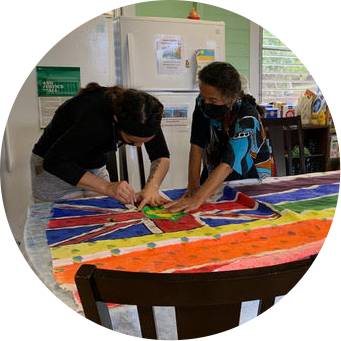Serving Hawai‘i’s Most Vulnerable Youth
Understanding the inequitable justice systems that harm Native Hawaiians and Pacific Islands from a young age.

Hawaiʻi’s Native Hawaiian and Pacific Islander youth are overrepresented at every stage of the justice system, with challenges rooted in the history of occupation and colonization. Challenges faced by Native Hawaiians date back to the illegal overthrow of the Hawaiian Kingdom during Queen Liliʻuokalani’s reign in the 1800s. Nearly every Native Hawaiian alive at the time signed a petition opposing subsequent annexation by the United States. This history left unresolved deep-rooted sentiments feeding from the social injustices Native Hawaiians have experienced for generations.
As a minority in their own homeland, data on Native Hawaiians parallels the negative statistics that other BIPOC communities experience today and for generations. Native Hawaiian youth are the most impacted, caught up in this cycle of vulnerability and insecurity that has led to intergenerational trauma and resulting conditions of poverty, homelessness, and imprisonment.
By advancing an Indigenous model rooted in Hawaiian knowledge and cultural practices, reengaging with elders, and reconnecting to the land and community, OYAH and our State partners offer services on the Kawailoa campus that help youth to heal, recognizing their promise as positive community contributors.
This Public-Private Partnership seeks to ensure racial equity in the healing of Hawaiʻi’s most vulnerable youth.
Challenges Facing Native Hawaiian and Pacific Islander Youth

Youth Experiencing Homelessness
Native Hawaiian and Pacific Islander youth account for a staggering percentage of the homeless minors and young adults in the state and make up more than half of youth who are transitioning into adulthood from foster care.
2 Partners in Care, Oahu’s Continuum of Care, O’ahu Point-in-Time Count Comprehensive Report, 2020.
3 State of Hawaii, Department of Human Services Social Services Division, Hawaii Data Booklet Annual Progress and Services Report FFY 2021, 2020.
An Inequitable Justice System
Native Hawaiians and Pacific Islanders have long been disproportionately overrepresented in the juvenile justice system, receiving harsher sentences for petty crimes of poverty, as experienced by BIPOC (black, Indigenous, and people of color) and transgender individuals. Often, NHPI ʻōpio (youth) face trauma, loss of loved ones, broken relationships, depression, substance abuse, sex trafficking, and economic instability— all worsened by confinement.
Incarcerated Native Hawaiian young adults are particularly susceptible to recidivism with a reoffense rate much higher than the overall state rate.
Lack of Programs, Services, and Support
Hawai‘i’s criminal justice system is fragmented and deficient, preventing justice-involved youth from addressing the underlying causes of their challenges and leading successful lives. There are no formal pathways of family-centered, culturally grounded alternatives to incarceration, especially those most vulnerable to justice system entanglement.
In addition, Hawaiian community voices and cultural programs capable of helping youth heal have been marginalized for decades, further disenfranchising communities that suffer from intergenerational trauma and structural racism.
Comprehensive reports and research point out barriers to successful reentry of Native Hawaiians into the community from incarceration, including:
- Lack of programs and services in prison to prepare individuals for returning to their community
- Unavailable or culturally inappropriate programs and services
- Lack of knowledge about historical trauma and its impact on Native Hawaiians
Research on neuroplasticicity of the brain shows that adolescents and young adults are capable of transforming their lives if afforded the right opportunities to learn and grow. Many of our youth are capable of change, yet struggle with “evidence-based” western models and approaches disconnected from their lived experiences.
Voices of Our Community
 “I experienced periods of homelessness in my youth, and I learned firsthand how helpful the actions of compassionate individuals can be in challenging times. So I decided to volunteer at RYSE because it gives me opportunities to give back what I received, and hopefully contribute to making a difference, even small, in some of the youths’ lives.”
“I experienced periods of homelessness in my youth, and I learned firsthand how helpful the actions of compassionate individuals can be in challenging times. So I decided to volunteer at RYSE because it gives me opportunities to give back what I received, and hopefully contribute to making a difference, even small, in some of the youths’ lives.”
— Dominique Meyer Gere, Volunteer
Get Involved
Join this work to support opportunities for youth in building greater belonging, purpose, community connections, education, workforce readiness and skills to contribute to and lead healthy, thriving families and communities in Hawai’i and beyond.
